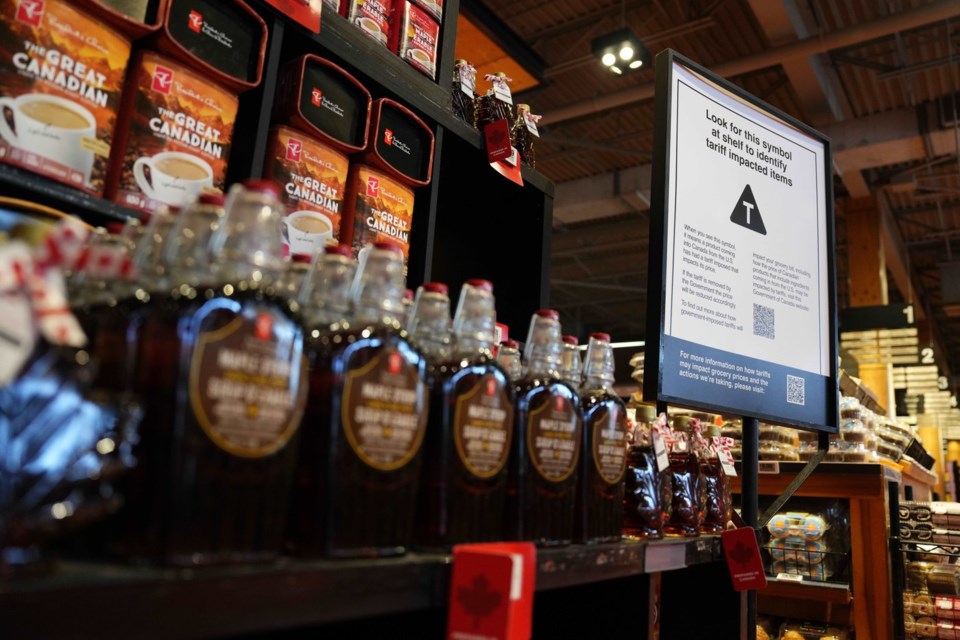OTTAWA — Canada's move to drop many retaliatory tariffs on U.S. goods could lead to lower prices for consumers, but union leaders worry it could undermine this country's bargaining position in ongoing trade talks.
Prime Minister Mark Carney announced Friday that Canada will drop some retaliatory tariffs on American products to match U.S. tariff exemptions for goods covered under the Canada-United States-Mexico Agreement.
Carney said at a news conference his decision will take effect on Sept. 1, 2025.
Colin Mang, assistant professor of economics at McMaster University, said the "big winners" from the announcement are consumers and retailers who import American goods, like Loblaws, Metro and Sobeys.
"For consumers, this is definitely going to be a positive because by removing these tariffs, what you're going to start to notice is that prices come down again at the grocery store for some of the things that were tariffed like orange juice," Mang said.
Mang said consumers will likely also see prices drop on items like American spices, nuts and baked goods.
"A typical family doesn't often consume huge quantities of those, so they may not notice a significant price drop, but it will be meaningful over time," Mang said.
Mang said the relief consumers will feel when shopping will depend on choices made by retailers, many of whom raised prices anywhere between 10 to 15 per cent or more when tariffs were in place.
"It'll be interesting to see how the retailers react with tariffs going away, if they leave prices as they are and just soak up extra revenues, or if the retailers decide to pass on some or all of that tariff cut back to consumers," Mang said.
"I hope that they will decide to pass the savings back on the consumers, but you never know, once prices go up, it's hard to see them coming down because retailers realize that people are willing to pay."
Carney said Friday that Canada and the U.S. have re-established free trade for the vast majority of goods. He said Canada will retain tariffs on steel, aluminum and autos as it works with the U.S. to resolve issues.
The Canadian Federation of Independent Business celebrated the decision to drop some retaliatory tariffs and said that will take some of the pressure off small Canadian businesses as trade talks continue.
Corinne Pohlmann, the CFIB's executive vice-President for advocacy, said recent research from the organization found that the two highest tariffs impacting members are on aluminum and steel, followed very closely by Canadian counter tariffs.
She said over half of members said counter tariffs were having an impact on their business and that removing those that are CUSMA compliant should have a positive impact.
Those in the steel, aluminum or auto sectors are "still going to feel it," she said, though it will be beneficial for many smaller companies who are importing products.
Pohlmann said businesses that have been paying tariffs for several months will need time to "recover." She argued that money that has been collected by the federal government through counter tariffs should be returned to businesses so that they can get back up and running or pivot to other markets.
"We're hopeful that this may make a dent into some of the issues that some of them have been facing," she said, adding that some businesses were absorbing prices or increasing prices as a result of the tariffs. "We may see some prices come down, we may just see businesses being able to sort of breathe a little bit more easily."
Unions are feeling less positive about the government's decision to drop retaliatory tariffs.
Unifor said in a statement that the move "undermines Canadian workers and weakens Canada’s bargaining position in an escalating trade war."
"Donald Trump’s attacks on Canada’s auto, steel, aluminum and forestry sectors are hitting workers in real time," said Unifor National President Lana Payne. "Walking back counter-tariffs is not an olive branch — it’s an open invitation for more U.S. aggression. It sends the wrong signal at the worst possible moment."
Payne said that Canada shouldn't give up counter-tariffs unless the U.S. drops "all of its unfair tariffs."
"Backing down with concessions is a betrayal of the workers who are and will be paying the price," she said.
Chris Roberts, the national director of the social and economic policy department of the Canadian Labour Congress, said the government of Canada needs to "stand up" and fight to have tariffs removed rather than accept them as "the new normal."
"The consequences are that investment, production and jobs are going to flow away from Canada to the United States, and it's going to have devastating consequences for strategic industries," Roberts said. "We've got to see a return of the Mark Carney that was elected to keep our elbows up and resist the pressure from the United States."
Roberts said the government needs to take urgent measures to reduce the economic pain felt by Canadian employers, workers and consumers.
"The course that's being described here today, I think is one that's not going to serve the Canadian economy and the industries and workers in the long run," Roberts said.
This report by The Canadian Press was first published Aug. 22, 2025.
Catherine Morrison, The Canadian Press




